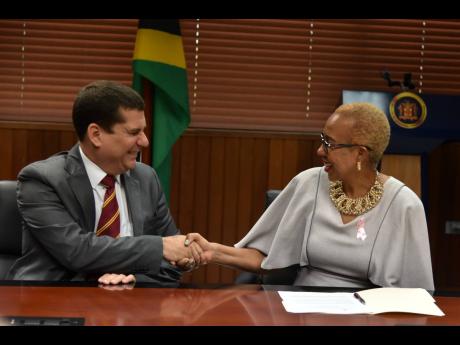Cuba proposes special-ed teachers, psychologists for local schools
Cuba is looking to expand its collaboration with Jamaica by supplying special-education teachers to address the deficit in the sector locally.
Cuban Ambassador Fermin Gabriel Quiñones Sánchez made the proposal on Wednesday during a courtesy call on Minister Fayval Williams.
Special-education teachers cater to students with learning disabilities, intellectual disabilities, visual and learning impairments, communication disorders, and behavioural disorders.
“We have a very important programme with The Bahamas in place, and the Bahamas government is very happy with the way how the Cuban teachers have been working with them. I know that sometimes the way governments handle things are different, but we can accommodate the interest and concerns of the Jamaican side in order to work together in this important area,” the ambassador said.
Quiñones Sánchez said the proposal forms part of the improved academic support pledged in a recent memorandum of understanding between Jamaica’s Ministry of Education and former Cuban Ambassador Inés Fors Fernández to extend bilateral cooperation in education.
He said there were 69 Cuban teachers currently employed in Jamaica, the majority of whom teach Spanish, while others provide instruction in the science subjects.
“The issue of education and education cooperation is one of the most important. Cuba is ready, and the Ministry of Education in Cuba is ready to continue supporting this programme and increase it as well, ... taking into account information from newspapers and internal debates ... the problem facing the educational system in Jamaica,” he said, referring to concerns about teacher attrition rates.
On September 1, Williams had indicated that 248 public school teachers had resigned their posts since July.
Educators have also been expressing concern over the difficulty in finding teachers to fill some vacancies, especially in technical and science subjects.
Quiñones Sánchez said that another aspect of the programme’s expansion would include bringing in Cuban psychologists to work in Jamaican schools to help to combat violence.
“There are children that cannot move forward as some others used to do, and they need very special attention. And very special attention not only for learning, but special attention for children who are living in vulnerable communities, and their needs have to be tackled by a specialised person,” the ambassador said. “Work in this area would be extremely important, tackling not only educational problems, but tackle social problems in the country as well.”
Williams, who described the education partnership between Cuba and Jamaica as “invaluable”, welcomed the proposal.
“We’ve had a focus on that (special education) as well here. We’ve been raising awareness about it, and so the demand for special education has been more and more. We’re doing more testing of children to identify where they’re having issues, and so we’re seeing greater demand for special-education services through the sector,” she said.
Since 1997, approximately 472 Cuban teachers and professors have offered their services in Jamaica.

